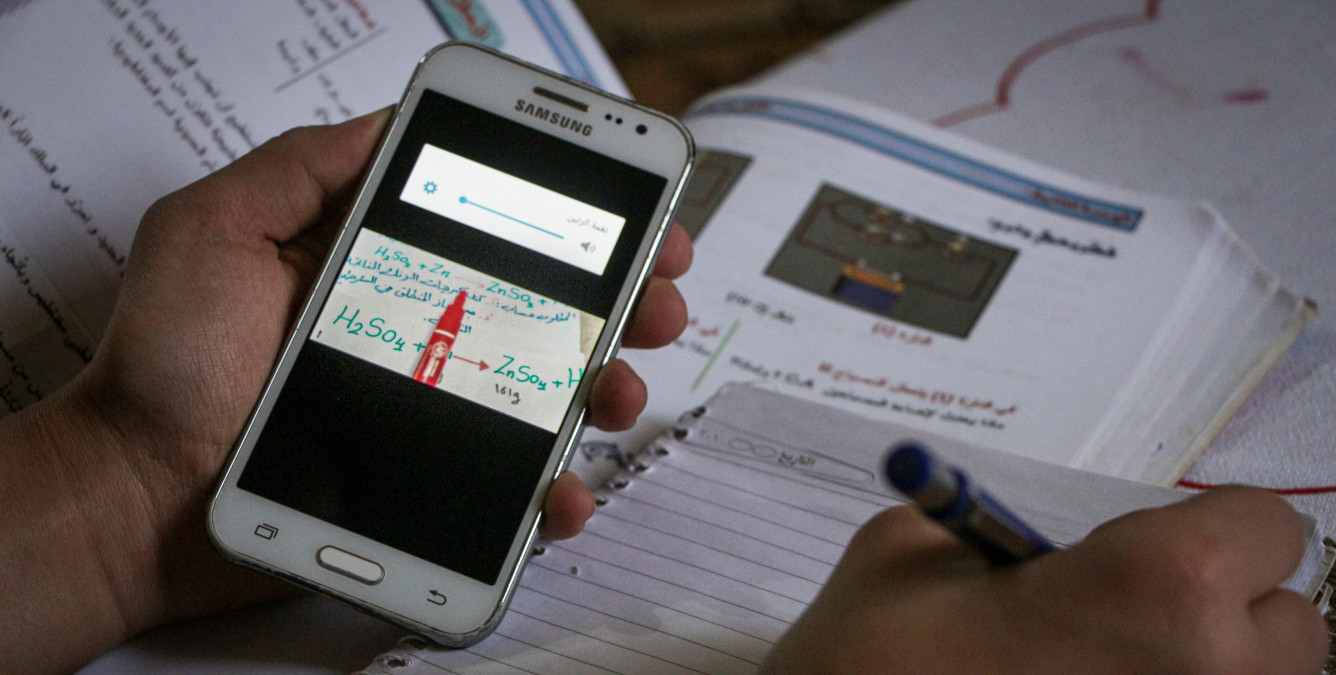Keeping the Textbooks Open with Distance Learning in Syria
Published: May 26, 2020 Reading time: 5 minutes Share: Share an articleDuring any crisis, the longer children are out of school, the less likely it is that they will return once schools re-open, resulting in increased dropout rates. But in Syria, access to education means much more than lessons; schools and child-friendly spaces also help protect children by providing safe and stimulating environments in which to play, learn, and develop.

This is why when authorities in Syria closed schools and learning centres in March after the global COVID-19 pandemic was declared, People in Need (PIN) started to work with teachers and facilitators in northern Syria to develop a distant learning methodology.
“In these very difficult times the need to continue learning is considered essential,” says Hasan, a teacher of mathematics for 120 students in Idlib province.
PIN’s education team organised workshop and training sessions to develop an agreed methodology and provided educators with the knowledge and resources to thrive. PIN also facilitated coordination with schools and teachers to provide continued support and mentoring.
“We had very useful discussions based on our experience during the first days [of social-distancing],” says Hasan. “We had already created WhatsApp groups with students and parents, and during the training, we received advice and recommendations [on how to use these groups properly], such as avoid sending too many video recordings and prioritise voice notes, use images, and set routine homework that is prepared in advance.”
Once the system of distance learning was created, the next challenge was putting it into practice. “First we had to coordinate with the pupils’ parents and create WhatsApp groups for each subject,” Hasan says. “We then set up a schedule for sessions and planned them well in advance.”
While the initial setup required new degrees of flexibility, Hassan, like other enthusiastic teachers, has embraced the challenge and is now extremely motivated. In fact, PIN has witnessed how the quality of teaching has increased during this period of social distancing as teachers are in the spotlight more than before and their work is more public. At the same time, there is a stronger involvement of parents, who have been pushed to participate in their children’s education.
No matter the circumstances
Physics problems can be tough for many students, but not for 14-year-old Hussein, who has found a new admiration for maths during his distance learning education. “I absolutely love [physics problems] and find them easier and more interesting than history and geography,” he says. “I enjoy learning equations and solving difficult maths and geometry questions.” Hussein has also learned the maths codes for communicating through WhatsApp, a vital skill with the new online methodology that is in place.
“We have a group chat for all teachers and all students [from 8th grade], and then we have separate groups with the teachers of each subject,” he explains. “For example, we have a group for physics where there is the lesson and where we can ask questions and send our homework back to the teacher. But we do not send things like that to the wider group, to avoid spamming.”
Hussein admits that “learning over the internet is a bit more difficult than in the classroom.” Still, “it is much better than sitting at home and doing nothing. I am able to learn and make use of my time.”
His motivation is crucial as he intends to continue learning to reach his goals – no matter the circumstances. “I would like to have a university degree for a successful future and a job. When I grow up, I would like to be a land engineer or an architect, to either help my father and relatives to identify their land, or in order to plan my own home and have builders to build it as I would like it to be.”
Prioritising psychosocial support
For Mohammad, a father of four, this period of distance learning has also been rewarding, even if it has brought new challenges. "Despite all the difficulties we face – like being displaced, living in a tent in a camp, and the threat of the pandemic – I enjoy the time I now spend with my children to do psychosocial support activities we receive from PIN’s team,” Mohammad says. Prior to the lockdown, spending so much time with his children was simply not feasible.
Mohammad relies on an old mobile phone that has now become an essential lifeline to facilitate his children’s education. “They [PIN] share many useful things [through WhatsApp], including advice, instructions, and games to teach children how to protect themselves from COVID-19.”
Shahod, who is in a similar situation and lives with his family of nine in a camp in northern Syria, says he waits “impatiently” with his children for the activities that PIN sends. “This is an opportunity to be with my children. I have never been this long with them."
These psychosocial support activities are distributed through WhatsApp in 15 camps for displaced people in northern Syria. PIN is also exploring ways to improve access to technology and the internet for the most vulnerable families.
***
Since 2013, People in Need has been helping to repair and re-open schools, help out-of-school children return to class, and support those who can’t attend formal school with child-friendly spaces. This year, we are supporting 15,500 children in northern Syria, and for now 85 percent of them are regularly participating in the distance learning program. These activities are made possible with funding from the European Union (through the European Neighbourhood Instrument -ENI and EU Humanitarian Aid), the Czech Republic Development Cooperation and the Swiss Agency for Development and Cooperation.
Learn more about our work in Syria here.
*WhatsApp animations above are fictionalized conversations based on real conversations that students and teachers we support have had in recent weeks.









